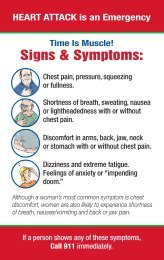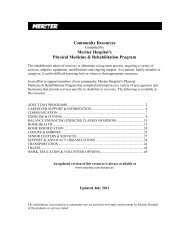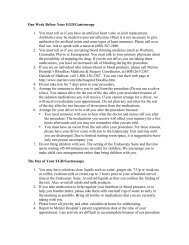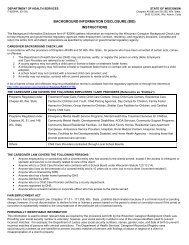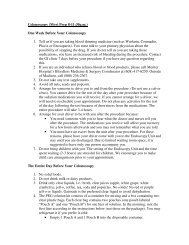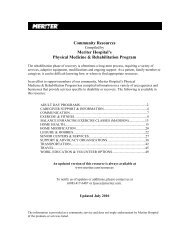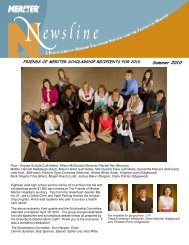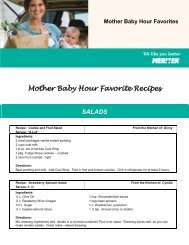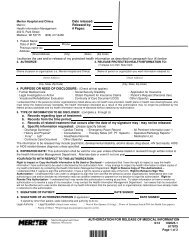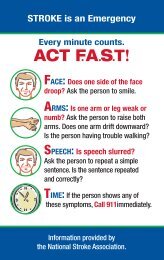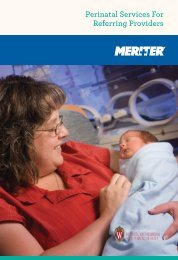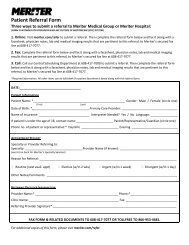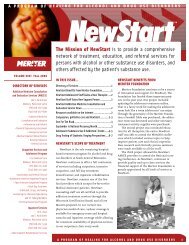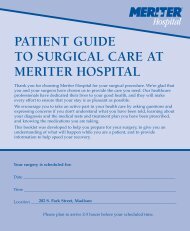A Guide To Your New Family's First Weeks - Meriter Health Services
A Guide To Your New Family's First Weeks - Meriter Health Services
A Guide To Your New Family's First Weeks - Meriter Health Services
Create successful ePaper yourself
Turn your PDF publications into a flip-book with our unique Google optimized e-Paper software.
Nutrition and Feeding: Breastfeeding<br />
The American Academy of Pediatrics recommends exclusively breastfeeding babies during the first six months in order<br />
to provide optimal growth and development. The academy also recommends continuing to breastfeed through the first<br />
year of life and as long as both mom and baby would like beyond the first year.<br />
Benefits of Breastfeeding: For Baby<br />
• Provides protection from many illnesses including<br />
diarrhea, pneumonia, meningitis, ear infections and<br />
Sudden Infant Death Syndrome (SIDS).<br />
• Provides long-term health advantages, such as<br />
fewer allergies, decreased risk of obesity, and lower<br />
incidences of diabetes and other autoimmune<br />
system disorders.<br />
• Breast milk changes to meet your baby’s<br />
nutritional needs as he grows—from day to day<br />
and month to month.<br />
• Breast milk is easy to digest and never<br />
constipating. Mother does not need a special diet.<br />
• Breast milk tastes different every time your baby<br />
eats. This helps develop your baby’s sense of taste<br />
and smell.<br />
• Breast milk is always ready and available.<br />
Benefits of Breastfeeding: For Mom<br />
• Breastfeeding helps the uterus contract, which<br />
limits the bleeding experienced after delivery.<br />
• Breastfeeding causes the release of prolactin, the<br />
“mothering” hormone, which helps mothers feel<br />
more relaxed.<br />
• Women who breastfeed also tend to lose their<br />
pregnancy weight more quickly.<br />
• Studies show that breastfeeding reduces a woman’s<br />
risk of breast and ovarian cancer, and decreases<br />
the risk of osteoporosis.<br />
Additional Assistance<br />
If you ever have questions or concerns about<br />
breastfeeding, call <strong>Meriter</strong>’s Breastfeeding Helpline<br />
at (608) 417-6547 or 1-800-261-4449, or speak with<br />
your infant’s physician or nurse. Always feel<br />
comfortable asking for help—it is better to address<br />
breastfeeding concerns early on than to wait for a<br />
serious problem to develop. You can easily correct<br />
most breastfeeding challenges if you handle them<br />
early. We offer book and Web site suggestions in the<br />
<strong>Health</strong>y Living section of www.meriter.com.<br />
Breastfeeding <strong>Your</strong> Baby<br />
As with any new skill, it may take practice for breastfeeding<br />
to become “second nature” for both you and<br />
your baby. <strong>Your</strong> nurse is an excellent resource; ask<br />
her for help. We hope this information also supports<br />
your breastfeeding experience.<br />
Steps to Promote Successful<br />
Breastfeeding<br />
• Breastfeed “on cue”—Feed your baby when he<br />
shows early feeding cues (see page 24) and until<br />
content. Breastfeed for as long as your baby is<br />
actively nursing.<br />
• Breastfeed your baby at least 8-12 times per<br />
day—This gives babies the fluid and nutrition they<br />
need, and encourages a good milk supply.<br />
• “Room-in” with your baby—Keep your baby<br />
with you as much as possible, which allows you<br />
to identify early feeding cues. Spend as much<br />
time with your baby skin-to-skin as possible<br />
(see page 12).<br />
• Make sure your baby latches correctly—Look<br />
for a wide-open mouth, flared upper and lower<br />
lips and absence of pain while nursing. <strong>Your</strong> baby<br />
should be facing you, tummy against your body,<br />
her chin deep into the breast and her nose close.<br />
• Avoid giving your baby a pacifier in the early<br />
weeks—This decreases the time your baby gets<br />
to learn how to breastfeed, and may affect your<br />
milk supply and baby’s weight gain. Some babies<br />
can also have a hard time learning how to suck<br />
at your breast if using a pacifier. By waiting until<br />
breastfeeding is well established, your baby will be<br />
better able to learn how to nurse correctly.<br />
• Unless medically indicated, avoid giving your<br />
baby any supplements (water, sugar water,<br />
formula)—Giving fluids other than breast milk<br />
will fill up your baby and decrease the feeding time<br />
at your breast.<br />
21



